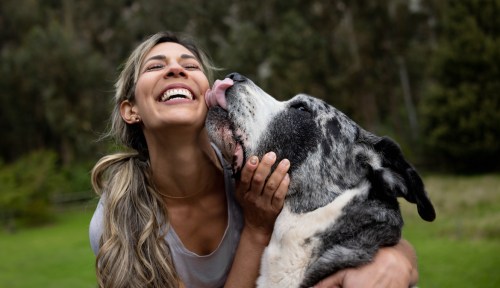Your relationship with your dog is probably the sweetest, least complicated one in your life. Yet you may sometimes question whether you should really let your best pal cover your face with sloppy kisses. The sad truth: Dog saliva carries germs. But just how big of a threat are those germs to your health? Here’s what a veterinarian and a family medicine physician have to say.
Experts in This Article
Soulful eyes, germy mouth
According to the American Kennel Club, a dog’s mouth contains around 600 types of bacteria, which is similar to what people have. There’s some species overlap there, but dogs also carry unique germs that humans aren’t equipped to fight off. Some of these microbes are zoonotic, meaning they can jump between species, and cause infections.
There’s also evidence based on a 2022 genetic study, published in Antibiotics, that canine saliva has plentiful numbers of bacteria containing transferable antimicrobial resistance genes. These dangerous genes may promote antibiotic resistance in humans, which you definitely don’t want.
Bacteria from dogs have a very low chance of penetrating intact skin, but they can get into your system through broken skin and mucus membranes like your eyes, nose, and mouth.
“All animals and people have bacteria, yeast, and viruses (called the oral microbiome) living in their mouths,” says Heather Berst, VMD, a veterinarian at Zoetis. “Many of these organisms are beneficial, but a few can be harmful if transmitted to people from dogs. The ones to be most concerned about are Clostridium, E. coli, salmonella, and campylobacter.”
Dogs can also have intestinal parasites that they could spread by licking, although Dr. Berst says parasites are more likely to spread through dog poop than by oral transmission.
And what about when Fido, you know, eats that poop? This icky habit is referred to as coprophagia, but whatever you call it, it’s gross, especially if your dog wants to lick your face afterward. “The fact that dogs eat poop is a concern for many people, but this doesn’t necessarily pose a significant risk to humans,” says family medicine physician Laura Purdy, MD, MBA. “While eating poop can introduce harmful bacteria into a dog’s mouth, the risk of transmission to humans from a dog’s lick is still relatively low.”
How worried should you be about a dog licking your face?
Your sweet doggy doesn’t know their mouth is a germ cesspool. They only know they love you and want to show it. The risks of transmission from licking your face are relatively small, but not non-existent, So, what’s a dog owner to do?
Dr. Berst isn’t only a veterinarian, she’s also a dog mom to Dottie, a highly affectionate rescue Chinese crested dog. “Every time I come home, Dottie gets super excited and crazily licks my face while wagging her tail—and I let her. That being said, I think you need to talk to your physician and your veterinarian if your dog licks your face regularly, as there can be some risks,” she says.
Dr. Berst and Dr. Purdy both feel that the most critical things to consider are the dog’s health status, and the person’s overall health. People with compromised immune systems should avoid having their dog lick them on the face. Elderly individuals and children should also show added caution.
How to protect yourself from dog germs
To start with, regular veterinary care for your pet is a must. This should include preventatives, like vaccines, that decrease the chance of transmitting zoonotic diseases to you and your family. “Make sure your pet is tested for parasites (worms) and is on a parasite preventative,” Dr. Berst says. “They should also be vaccinated for diseases such as rabies, and have their teeth cleaned regularly.”
Your dog’s diet also matters. Raw diets have become popular, but many veterinarians, including Dr. Berst, discourage their use. “Raw food diets increase the risk of transmitting food-borne illnesses. If I was around a dog and the owner fed the dog raw food, I would be cautious about that dog licking my face,” Dr. Berst says.
Also be wary around strays, who may eat moldy or rotted food off the street. Those that aren’t vaccinated or cared for may be more likely to carry disease. If you see a stray, contact a dog rescue organization that can get it the care it needs, and a forever home. In the meantime, stay clear of doggy kisses from dogs you aren’t familiar with.
Even if your dog gets optimum care, it’s a good idea to stop them from licking areas of open skin, like cuts and scrapes. “Even a healthy dog’s mouth may contain Pasteurella, a bacterium which can cause skin infections,” says Dr. Purdy. She also warns against Capnocytophaga canimorsus, a rare bacteria that can cause severe illness in people with weakened immune systems.
If your dog licks an open wound or bites you (it happens), contact your healthcare provider right away. Signs of infection like redness, swelling, or pus-like discharge require medical attention asap.
How to safely get love from your dog (and how to give it, too)
The symbiosis between humans and animals is clear. You probably need your dog’s unconditional love as much as they need yours. If you and your dog are both healthy, there’s no real need to forgo at least some of those loving, slobbery kisses.
If, however, you wish to be cautious or have cause for concern, Dr. Berst recommends training your dog to sit when you arrive home and wait for a treat or high-five, instead of a kiss. Cuddle sessions and petting are another powerful way to deepen your bond without the risk of swapping germs.
Sign Up for Our Daily Newsletter
Get all the latest in wellness, trends, food, fitness, beauty, and more delivered right to your inbox.
Got it, you've been added to our email list.











